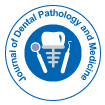Notre groupe organise plus de 3 000 séries de conférences Événements chaque année aux États-Unis, en Europe et en Europe. Asie avec le soutien de 1 000 autres Sociétés scientifiques et publie plus de 700 Open Access Revues qui contiennent plus de 50 000 personnalités éminentes, des scientifiques réputés en tant que membres du comité de rédaction.
Les revues en libre accès gagnent plus de lecteurs et de citations
700 revues et 15 000 000 de lecteurs Chaque revue attire plus de 25 000 lecteurs
Indexé dans
- Google Scholar
- ICMJE
Liens utiles
Revues en libre accès
Partager cette page
Abstrait
The fear of dentistry and receiving dental care is commonly known as Dentophobia or dental anxiety
Pranaj Dewan
Dentophobia, also referred to as dental anxiety, is a prevalent psychological phenomenon characterized by an intense and irrational fear of dental procedures and receiving dental care. This fear can result in significant distress and avoidance behaviors, leading to compromised oral health and well-being. Individuals with dentophobia often experience heightened levels of stress, apprehension, and physiological reactions when faced with the prospect of visiting a dentist or undergoing dental treatments. Dentophobia can stem from various sources, including negative past experiences, fear of pain, feelings of helplessness and loss of control, and cultural influences. The impact of dentophobia extends beyond the realm of oral health, affecting individuals' overall quality of life and self-esteem. As a result, it becomes crucial for dental professionals to adopt patient-centered approaches that prioritize comfort, communication, and gradual desensitization techniques to alleviate the fears associated with dental care. Efforts to address dentophobia involve a combination of psychological interventions, such as cognitive-behavioral therapy and relaxation techniques, along with advancements in dental technology that minimize discomfort and pain during procedures. Additionally, providing comprehensive information to patients about treatment procedures and options can empower them to make informed decisions and reduce anxiety. Highlights the significance of understanding dentophobia as a common barrier to oral health care and emphasizes the importance of creating a supportive and empathetic environment within the dental setting. By recognizing the multifaceted nature of dentophobia and implementing strategies to mitigate its impact, dental professionals can contribute to improved oral health outcomes and overall well-being for their patients.
Revues par sujet
- Agriculture et Aquaculture
- Biochimie
- Chimie
- Food & Nutrition
- Génétique et biologie moléculaire
- Géologie et sciences de la Terre
- Immunologie et microbiologie
- Ingénierie
- La science des matériaux
- Le physique
- Science générale
- Sciences cliniques
- Sciences environnementales
- Sciences médicales
- Sciences pharmaceutiques
- Sciences sociales et politiques
- Sciences vétérinaires
- Soins infirmiers et soins de santé
Revues cliniques et médicales
- Allaitement
- Anesthésiologie
- Biologie moléculaire
- Cardiologie
- Chirurgie
- Dentisterie
- Dermatologie
- Diabète et endocrinologie
- Gastro-entérologie
- Immunologie
- La génétique
- Maladies infectieuses
- Médecine
- Microbiologie
- Neurologie
- Oncologie
- Ophtalmologie
- Pédiatrie
- Recherche clinique
- Soins de santé
- Toxicologie

 English
English  Spanish
Spanish  Chinese
Chinese  Russian
Russian  German
German  Japanese
Japanese  Portuguese
Portuguese  Hindi
Hindi